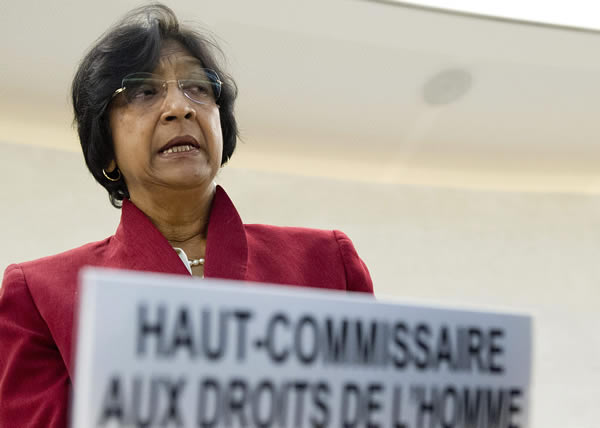The U.N. vs. George Zimmerman: Is this What “International Justice” Would Look Like?
Steven Groves /
One would think that Harvard Law School-educated Navanethem “Navi” Pillay, a South African jurist and current United Nations High Commissioner for Human Rights would have better things to do than get involved in the affairs of a democracy like the United States. Yet Pillay, who has served as a judge on the International Criminal Court and as the president of the International Criminal Tribunal for Rwanda, has made the same mistake many others have made: she has weighed in on the tragedy surrounding the shooting death of Trayvon Martin in Sanford, Florida.
The public, including Ms. Pillay, does not have the facts on the Martin case. Sadly, that has not stopped many pundits and activists from commenting, likely to the detriment of the investigation.
But Pillay should know better. On a recent three-day swing through Barbados—not exactly known as a hotbed of human rights violations—Pillay took time to condemn the shooting of Martin and demand action:
“As High Commissioner for Human Rights, I call for an immediate investigation.”
Perhaps Barbados does not carry U.S. news or have Internet access, because Pillay must not have heard that local authorities, the Florida Department of Law Enforcement, and the Department of Justice are all conducting investigations into the shooting.
No matter, since Pillay seems content to skip the investigation and trial, and go straight to the punishment phase of the proceeding:
“The law should operate equally in respect of all violations. So, like every other situation such as this, we will be urging an investigation, and prosecution and trial – and of course reparation for the victims concerned.”
The problem is that there can be no “reparation for the victims” unless and until a conviction has been attained against Zimmerman. While the shooter, George Zimmerman, was charged with second-degree murder last night, in the United States a defendant continues to be presumed innocent until proven guilty.
The United States is a democracy where the rule of law is respected, not a backward nation run by despots. Doesn’t the U.N. High Commissioner on Human Rights have actual violations of human rights around the world to address? Maybe in Cuba, laughably a member of the U.N.’s Human Rights Council? From Barbados she wouldn’t have needed to look very far. Perhaps it was a slow news day in Barbados.
Pillay’s rash intervention into a controversial and volatile issue such as this speaks volumes about the careless attitude often displayed by U.N. officials. More troubling is Pillay’s seeming lack of knowledge (or perhaps respect for) such basic concepts as due process and the presumption of innocence. Is this the type of justice that Pillay was accustomed to at the international level when she served as a judge on the International Criminal Court?
Pillay’s irresponsible and uninformed outburst provides additional evidence, as if any were needed, why the United States should not expose itself to criminal proceedings at the International Criminal Court. After all, with jurists like Pillay in charge, would American service personnel and military leaders stand much of a chance of receiving a fair trial?

